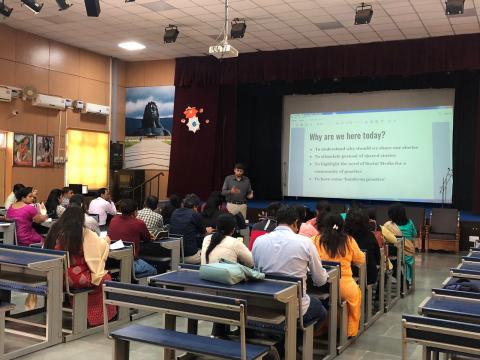
How does disciplinary thinking work?
Recently, I came across the idea of developing disciplinary thinking while reading—Unschooled mind by Howard Gardner. I found it fascinating. In the hustle-bustle of syllabus delivery, the teaching and learning in the schools are centred around the preparation of students for the examination. However, we are missing the real intent of imparting education. Our schools teach a variety of disciplines that can help us develop multiple perspectives on the world. It seems that even teacher training colleges fail to impart this idea to their students to think through their subjects. The shattered state of our teacher training institutions across the country makes it difficult to imagine it at school level.
As an example, I explore how history can develop a unique perspective among students. This is not a collection of facts: dates and names, popularly believed by people. It is also not merely a story of the past. Before moving on to the textbook content, I explain the disciplinary objectives to students.
I ask the students…
When you look in the mirror, what do you see? The mirror or yourself?
Answer…Ourselves!
This can be an approach to seeing the incidents of the past. It explains our present. There is a sentence from a song…Main Aisa Kyon hun (Why am I like that?), the answer lies in the events of the past. Even our dreams and aspirations are deeply rooted in our past.
A child from a doctor's family may not aspire to become a teacher, whereas, a child from a farmer's family may dream to be one. English, the language of status, opportunities, and dreams has a historical root. If India could have been colonized by the French, today you could have been reading this blog in French perhaps. During my stay in the USA, my roommate was from Cote D'IVoire and he was speaking French fluently and was struggling with English. His country was colonized by the French. Today's language could be different if we had been able to escape colonization. All that makes our present are rooted in our past. For a person with a historical perspective, it is like seeing the surroundings from the top of a multi-story building. You get a wider picture and escape the parochial view of the present.
One may argue…Fine, the past led to the present, we should now think for the future!
It sounds convincing. But the past is inseparable. And wherever it is separated it creates a hollow! Our sense of credibility is greatly enhanced when we examine the track records and chart their path through history. A nation without a history is not a nation but a makeshift arrangement which cannot last. Any substantial thinking must be rooted in our understanding of the past. Through this journey, historians discover the codes of change and continuity that sociologists and political thinkers can use to understand what leads to change and what does not.
The examples and arguments mentioned above can be summarized as the interconnection of phenomena, causation, change, and continuity. We can also see a very intense conflict between the individual and the existing socio-economic conditions. This has been an influential approach in Marxist thinking of history which is popularly known as the conflict theory. Marx sees history as a series of events that depict the class struggle. We also find many examples where the victory of the Individual shapes the course of history. In his book, the unschooled mind, Gardner writes… The development of disciplinary thinking takes time. It takes at least 10 years to develop. We need to ask ourselves...Do we even think about preparing our students for disciplinary thinking?
One proposal
- I would encourage some of my colleagues to write the disciplinary understanding of the subjects they teach i.e. Language, Mathematics, Science, Art, Music, etc.
Further Reading
- The Greatest Mind and Ideas of all time- Will Durant
- Unschooled Mind- Howard Gardner
- Social Science Learning in Schools
Perspective and Challenges : Ed. by Poonam Batra
- Log in to post comments
